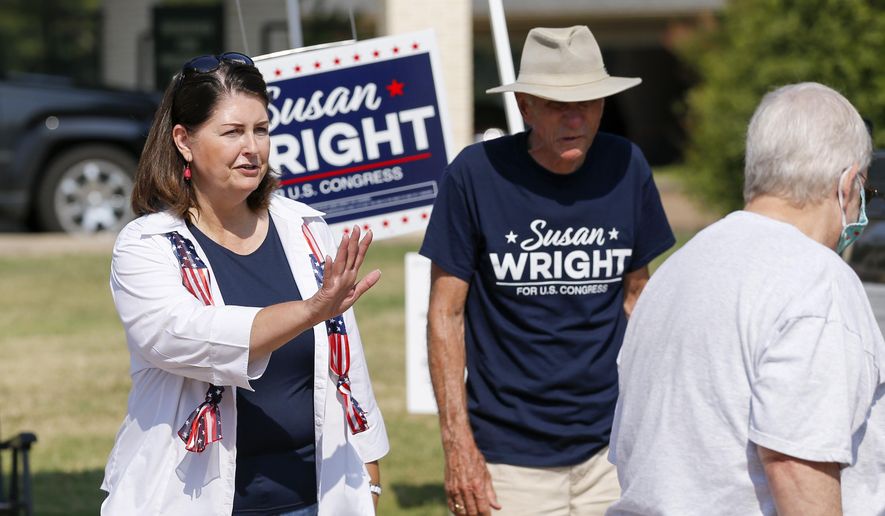The first loss of a Trump-endorsed candidate this year, in a special election in Texas, doesn’t diminish the former president’s clout in the Republican Party but shows that his endorsement alone isn’t enough for victory, analysts said Wednesday.
Susan Wright’s loss on Tuesday in Texas’ 6th Congressional District in suburban Dallas should serve as a warning to former President Donald Trump and his hand-picked candidates, said Cal Jillson, a political science professor at Southern Methodist University.
“You need a good candidate,” Mr. Jillson said. “They have to run their race. And then you need for Trump to get off his a— and do something.”
Mr. Trump’s endorsement of Mrs. Wright this spring to capture the House seat formerly held by her late husband, Ron, helped her to secure first place among 23 candidates in the primary in May. But she lost the runoff election on Tuesday to Republican state Rep. Jake Ellzey, by a margin of 53% to 47%.
Mr. Ellzey had out-raised Mrs. Wright in campaign funds by early July, $1.7 million to $740,000.
The former president didn’t campaign for Mrs. Wright, but he did record a robocall for her in the days before the vote and conducted a tele-town-hall event on Monday night. His super PAC, Make America Great Again Action, made a late $100,000 ad buy for her.
And the Trump-aligned Club for Growth spent nearly $1.2 million to boost her candidacy and attack Mr. Ellzey.
Rick Perry, a former Trump Cabinet secretary and former Texas governor who backed Mr. Ellzey, blamed the Club for Growth President David McIntosh for pushing Mr. Trump into a bad endorsement.
“He [Trump] totally was taken to the cleaners by the Club for Growth,” Mr. Perry told Axios on Wednesday. “There has to be a reckoning for the Club for Growth. This whole debacle for the president can be centered on the Club for Growth and David McIntosh. They put Donald J. Trump in jeopardy.”
Mr. Jillson said Club for Growth funded “nasty” attack ads and flyers against Mr. Ellzey that backfired with voters.
“They described Ellzey in a way that people in the district didn’t recognize, as an anti-Trump candidate,” he said. “Its role in this race was to be nasty in a way that people didn’t believe. They [voters] tend to think that this is the worst kind of politics.”
Club for Growth did not respond to a request for comment. Mr. Trump told Axios that he felt the Texas result was a win regardless because a Republican will keep the House seat.
Democrats and many mainstream media outlets called the result a “huge loss” for Mr. Trump and a failed test of his endorsement power. The high-profile defeat of his candidate came in the same week that Mr. Trump is meeting with Republican candidates from Wyoming who are vying to defeat anti-Trump Republican Rep. Liz Cheney. The former president wants the candidates who don’t receive his eventual endorsement to step aside, giving his preferred candidate a better chance of defeating Ms. Cheney.
Republican strategist Ford O’Connell said the loss in Texas doesn’t tarnish Mr. Trump’s status as the gold standard for endorsements in GOP primaries.
“Trump’s endorsement has been in no way diminished, and Republican candidates in primaries will literally cut off their finger or promise their firstborn to get it,” Mr. O’Connell said. “His endorsement in this race was successful because either way, a Republican holds the seat, and the runoff was not between a Republican and a Democrat. This is a case where you have a candidate who just sat on her laurels and got significantly out-campaigned by her challenger.”
Mr. Jillson agreed that “all the Republican candidates virtually will want Trump’s endorsement.
“They’ll celebrate it when they get it, they’ll be saddened if they don’t get it, but they need to realize it’s not going to win them the race,” he said.
Mr. Ellzey “played the Trump endorsement [of Mrs. Wright] very well,” Mr. Jillson said.
“He did not come out against Trump, and declared himself to be a Trump Republican, a Reagan Republican,” he said. “Ellzey was very determined. He ran to win, and she ran not to lose.”
Mr. Trump has endorsed 25 candidates since leaving office in January. The first one to face voters, Republican Julia Letlow, won her campaign in Louisiana in March to replace her late husband, Luke, who died from COVID-19 five days before he was to begin his term.
The next test for a Trump-endorsed candidate will come next week, when Republican Mike Carey squares off against 10 other Republicans in the primary of a special election to fill the House seat in Ohio’s 15th Congressional District. They are vying to succeed former Republican Rep. Steve Stivers, who resigned in May to become CEO of the Ohio Chamber of Commerce.
Mr. Trump brought Mr. Carey up on stage with him during a rally in Ohio last month. On Tuesday, he sent an email to voters doubling down on his support for Mr. Carey.
“Numerous candidates in the Great State of Ohio, running in Congressional District 15, are saying that I am supporting them, when in actuality, I don’t know them, and don’t even know who they are,” Mr. Trump said. “But I do know who Mike Carey is — I know a lot about him, and it is all good.”
Mr. Stivers is backing state Rep. Jeff LaRe.
• Dave Boyer can be reached at dboyer@washingtontimes.com.




Please read our comment policy before commenting.